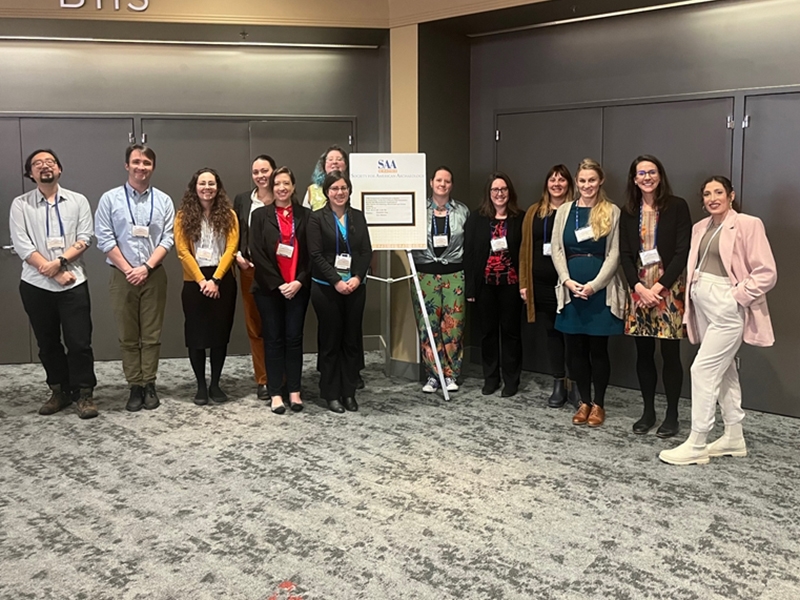
The Center for Advanced Spatial Technologies is set this week to host eight visiting early-career researchers in archaeology and cultural heritage management. The week-long training workshop focuses on how technological innovations in geospatial data can be used to explore, understand, and communicate insights about the human past.
The workshop is part of the Spatial Archaeology Residential and Online Institute (SAROI), supported by the National Endowment for Humanities' Institutes for Advanced Topics in the Digital Humanities, that concludes this summer. Over the course of the past three years, SAROI has supported 20 junior scholars for an online and in-person training and mentorship program based at CAST. The Fellows represent 19 different institutions who conduct research in 15 countries (and nine U.S. states, including Arkansas).
"When you think about the impact that the University of Arkansas can have around the world through just a single initiative, it's tremendous," remarks Carla Klehm, research assistant professor at CAST and principal investigator for the project. "The U of A serves as an excellent venue for the workshop, and the expertise located here has an outsized impact on the academic community. SAROI has also served to recruit multiple talented scholars to join us at CAST as postdocs and affiliated researchers, and strengthened ties with the Arkansas and Oklahoma Archaeological Surveys, who in turn lead important education initiatives within our region."
The Spatial Archaeology Residential and Online Institute has three main components:
- Pre-institute online materials;
- Two residency workshops, held in two successive summers; and
- Individual mentorship.
Fellows have access to online educational content geared towards spatial topics in archaeology and heritage management such as coordinate systems, datums and projections, georeferencing, aerial photography and photogrammetry, satellite remote sensing, GNSS, digital terrain modeling, LiDAR, 3D modeling, and use of archived spatial datasets. The workshops take place over the course of two summers and cover data acquisition and processing in the first year, and visualization, publication, and archiving in the second year. CAST faculty and staff serve as mentors throughout the fellowship period.
This year's visualization and publication workshop tends to be a favorite among the Fellows and Mentors alike, featuring CAST projects such as Rising Above, an archive, digital reconstruction, and relational database about the WWII incarceration of Japanese Americans in Arkansas; and the recently concluded Digital Storytelling on African Urbanisms project that sought to empower secondary school and university educators based in low-resourced environments Global South to connect with their cultural heritage. Knowledge gained from these projects tends to generate discussion and new ideas among the Fellows as they work on their projects and can lead to collaborations with CAST colleagues.
"The value of this program already been demonstrated to the university by working alongside this group of diverse, talented set of researchers. The opportunity to use our drone-based LiDAR to uncover lost history at Lone Rock was particularly meaningful to me," adds Malcolm Williamson, senior research associate at CAST.
The Lone Rock Stockade project, directed by SAROI Fellow Camille Westmont, a Marie Curie Fellow at the University of Cambridge, brings to light the history of the Southern convict leasing system. Between 1871 and 1896, over 4,300 men, women, and children were shipped from the Tennessee State Penitentiary in Nashville to the Lone Rock Stockade in the Grundy Lakes Valley near Tracy City, Tennessee, where they were worked, sometimes to death, in coal mines and coke ovens owned by the Tennessee Coal and Iron Company. Over 75% of those sent to the Lone Rock Stockade were African American. SAROI mentors Malcolm Williamson, Angie Payne, and Carla Klehm all participated in the collaboration.
More about the SAROI program can be found on its website.
About the Center for Advanced Spatial Technologies: The Center for Advanced Spatial Technologies, or CAST as it is better known, was founded in 1991 as a research center in the University of Arkansas' Fulbright College of Arts and Sciences. It is dedicated to research and applications in geospatial analysis and modeling, enterprise spatial databases, remote sensing, digital photogrammetry, and geospatial interoperability. CAST has been selected as a Center of Excellence by Leica Geosystems, Intergraph Corporation, Oracle Corporation, Trimble Navigation Ltd., Trimble/Definiens Imaging Software, Safe Software, PCI Geomatics, eSpatial Systems and has been involved in a multi-year CRADA's with ESRI. With partners at the university, state, national and international level, CAST offers students, faculty, and the public opportunities to learn about and use geospatial technologies.
Topics
Contacts
Carla Elizabeth Klehm, research assistant professor
Center for Advanced Spatial Technologies
479-575-6159,